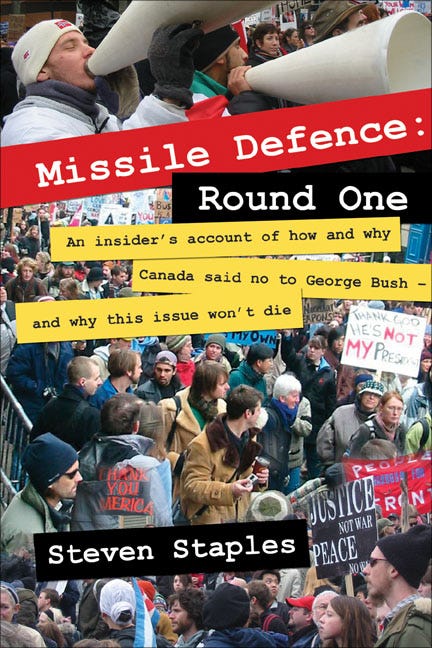Trump orders space weapons be put in orbit
Canada’s response is utterly shocking
Good morning – here is your Saturday newsletter.
More and more people are supporting PeaceQuest’s peace education impact by becoming paid subscribers. A heartfelt thanks to our two new subscribers this week.
In peace,
Steve
Amid the chaos created by Donald Trump’s wild proclamations – including against Canada – the media practically ignored a far-reaching order signed by the President on January 27.
The Iron Dome for America Executive Order commands the U.S. Secretary of Defence to submit a plan within 60 days for the, “Development and deployment of proliferated space-based interceptors,” as part of a next generation continental missile defence system.
Canada has steadfastly refused to join schemes that will put weapons in space, but our Defence Minister Bill Blair’s reaction was a complete surprise…
Ronald Reagan’s Star Wars
Back in the 1980s President Ronald Reagan proposed a missile shield to try to defend the United States from a nuclear attack by Russian intercontinental ballistic missiles (ICBMs).
Part of the system was known as “Brilliant Pebbles” where missile interceptors on orbiting platforms could be launched to collide with Russian ICBMs, destroying them early in flight.
The technical problems and cost proved insurmountable. The missile platforms would be moving at very high speed at the edge of the atmosphere, requiring thousands of such missiles orbiting the Earth in order to keep enemy ICBM launchers in range around the clock. It was never built.
George W. Bush and Canada’s “No”
Twenty years ago this month, in February 2005, Prime Minister Paul Martin announced that Canada would not join President George W. Bush’s scaled-down version of Reagan’s dream.
The citizen campaign against Bush’s ballistic missile defence program was the subject of my 2006 book, Missile Defence: Round One (published by Lorimer).
Bush and his Defence Secretary Donald Rumsfeld went ahead with 40 problem-plagued ground-based missile interceptors based in Alaska and California, aimed at intercepting a handful of missiles fired by North Korea or Iran. The system cost billions of dollars, and has remained largely unimproved ever since.
Why Canada said “No” to Star Wars
There were plenty of good reasons why Canada didn’t join Bush’s plan.
First, the system was inaccurate and could be easily overwhelmed by decoy warheads.
It was incredibly expensive and Canada’s contribution in terms of money or territory – and the benefit to Canada’s security – was never evident.
The American missile shield arguably spurred the development of more advanced missiles by others that travelled at high velocities and could out-manoeuvre defences, rendering the shield useless while causing an arms race.
Finally, space has been kept weapons-free (though heavily militarized through satellites)… until now, potentially.
Canada’s about-face for Donald Trump
Despite heavy lobbying by the so-called Defence Lobby and weapons corporations, the Federal government (under both the Conservatives and Liberals) has not changed our nation’s rejection of missile defence and the weaponization of space.
But following Trump’s Executive Order, our Defence Minister Bill Blair told reporters that Canada was, “a ready and willing partner.” Minister Blair added, “Frankly, an integrated missile-defence system for all of North America is the thing that makes sense to everybody.”
Interestingly Blair’s comments were only reported by The Globe and Mail, and is nowhere to be found on the CBC News’ vast website.
Can we resist Trump?
Obviously, Canada is under tremendous pressure from the United States, and there will be officials and corporate leader who want to appease Donald Trump. That’s why civil society organizations have been urging Canada to maintain an independent foreign policy.
You can add your name and learn more about the Pledge for Canada from my fellow Substack writer and NDP Member of Parliament Charlie Angus.
If you found this article interesting or informative, please Like, Share or Leave a comment.
Last week’s poll results
Last week I asked you, “Given global events, when do you think the war in Ukraine will end?” More people said “later” (44%) than “sooner” (13%) by a margin of three-to-one. One quarter answered “maybe never” (23%) and many said they didn’t know or were unsure (21%).
Did you miss last week’s newsletter?
Viewed 1.72k times
Thank you for everything you do for peace,
Steve








